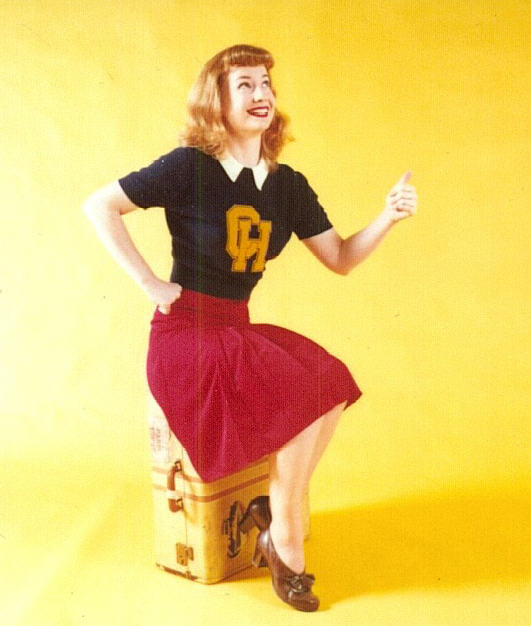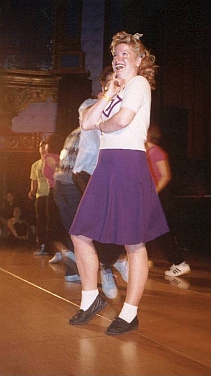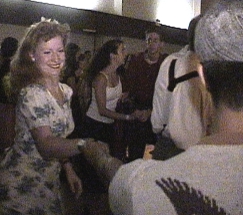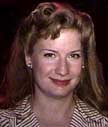Hilary Alexander is one of the most active people when it comes
to keeping the swing scene alive and exciting here in L.A. She
produces one of the most popular swing camps in the world --
Where were you born and raised?
I was born in Stoneham, Massachusetts, but we moved to New York City when I was nine. Then I moved to LA when I was 20.
How and when did you first discover swing and lindy hop?
My mother is a jazz pianist, so I grew up with swing and bebop. One night in '95 I saw an ad for a swing show at the El Rey, so I went over there just to hear some music, and was amazed by the dancing. People kept asking me to dance and I had to say I didn't know how, and that's when I said, "I've got to learn this."
How did you learn how to dance?
I first learned some east coast swing through a class at the Learning Annex, but I learned to Lindy Hop at PBDA.
What have been the highlights for you as a lindy hopper?
Doing "Beverly Hills, 90210" was definitely a highlight. We had this wild jam there after we were done filming, with Brian Setzer playing live for us. I don't think anyone there will ever forget it. There were some Palace and Hollywood Athletic Club shows that were pretty great, too. Also, I remember when The Big Six would come to town and set the Blue Café bar on fire. Those British swing bands really know how to put on a show.
What's your favorite thing about dancing?
It has to be the social aspect you meet a lot of really nice, like-minded people. Of all the "scenes" around, this has to be the nicest, most welcoming one.
How did you come up with the idea for Camp Hollywood?
I was at Catalina in '98 and I was thinking that some of us local kids really needed to put on a camp there were a lot of changes then; Shag and Balboa were being dusted off, Dean Mora was playing the Derby every Monday and people were really getting into the vintage aspect of dancing. I felt this new movement (which became Hollywood Style) really needed a "home", so hence the idea of Camp Hollywood.
I know that organizing a camp is a lot of work and hasn't made you a wealthy woman yet. What is the greatest reward that makes it worth it for you?
I think it's every year when I see tons of people there I've never seen before, wearing wedges and bucks and letterman sweaters it's so amazing to think there are little pockets of people all over the world that are just as enamored of the old styles as I am, who would come all that way just for one weekend with people like them. It's kind of cool to think about the level of dedication that takes.
What was your profession, prior to quitting your job to focus exclusively on Camp Hollywood?
I worked for MGM and then Paramount, doing digital mastering. I was in the Editor's Guild and had gone to film school in NY, which is partly how I am able to edit all my camp videos now.
How has your life changed now that you're an entrepreneur?
Well, it sure is great getting to sleep in! There is more stress in the sense that you don't have a steady paycheck and the future is always very uncertain, but in these times there's not much security in full time employment either, so I figure at least this business is something I have some control over. It is great to be your own boss.
You also started producing contests what was your motivation for that?
Well, I remember in the summer of '98 there were tons of contests around town. Minn and I used to just hit them all and take home a couple hundred dollars a week it was great! Since the incentive was there, people started to partner up, work on aerials and routines, and really work hard to be better dancers. Sometimes trophies and money are what it takes to get people to work at dancing! Just observing this phenomenon made me realize that contests, for a lot of people, keep the interest and incentive going. It gives people something to strive for, especially when it's a national title. Otherwise I think it's easy to lose interest and feel like what you're doing is kind of monotonous. I like things to be goal-oriented.
What's your advice for those dancers who want to become successful competitors?
I think the most important thing is just to be tenacious about it people get discouraged too easily. I probably have lost more contests and had more partners than just about anyone, but I'm still out there doing it, because under it all, it's just plain fun.
What are some of your favorite hobbies (other than dancing)?
Well, I've been trying to teach myself to play the guitar I still suck at it, but it's fun for me. I also love to cook and am a huge independent film fan; I try to make it to all the Independent Feature Project screenings.
How would you describe the L.A. dance scene when it comes to swing and Lindy Hop?
I think we're in another transitional phase right now things could really go any way. It's kind of good because we're down to the real dedicated people. It kind of reminds me of when I started and it was all underground and only the people who were really into it were out dancing. It wasn't trendy then. But I do think the onus is on us organizers to keep it active and fun. I'm always trying to come up with new ideas and new events to keep people into it I guess I'll just keep doing it until people stop coming!







